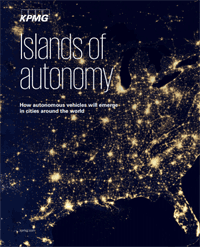A combination of technologies, including autonomous vehicles and artificial intelligence, are combining to create "something magical, a new and disruptive transportation mode: driverless vehicles coupled with mobility services."
Supply Chain Digest Says... |
|
|
So says consulting firm KPMG boldly in a new report titled "Islands of Autonomy." And KPMG says this is a really big deal, predicting this change "will be transformative in the same way the smartphone and personal computer have been."
KPMG adds that "We think consumers will likewise flock to this new transportation mode, changing forever their relationship to cars and transportation."
But, the report says, the roll out of such systems will not be ubiquitous in nature, or occur all at the same time, as arguably PCs and cell phones experienced their rapid growth phases.
Rather, KPMG says, carmakers will have to think of this adoption as coming place by place, location by location – hence the "islands of autonomy" title for the report.
Cities are the natural place for this autonomous delivery technology to take hold first for a couple of reasons. That includes high population density that can lead to delivery times as fast as 2-3 minutes, the report says. No time for your pizza to even get cold.
In addition, early autonomous cars "will operate most effectively in geo-fenced city centers, where they can make the frequent observations of the driving environment they will need to gather data and improve performance," KPMG says.
The implications will be huge, impacting urban design, highway and road construction, where and how many parking spaces are needed and much more.
The automotive industry as we know it will also be dramatically affected.
"The current market, which has existed for decades, will no longer be recognizable. In its place will be a market driven by product, service, and investment decisions according to the requirements of consumers on these islands," KPMG predicts.
(See More Below)
|
CATEGORY SPONSOR: SOFTEON |
|
|
| |
|
|
It will also be a brave new world for consumers. Are you ready for a scenario in which consumers "can push a button and their driverless car will appear, or push another button and a mobility service will arrive. The vehicle that appears before them will accommodate their need to go to the office, go to the grocery store, spend a night on the town, or take that ski trip."
With this kind of service, who will need to own a car? Not many, it would seem – and that is bad news for today's automakers.
How bad is that news? "We calculate a massive decline in personally owned sedans in the United States as a result of these islands, dropping from 5.4 million units sold today to just 2.1 million units by 2030," a cataclysmic decline of more than 50%.
 As a result, KPMG expects that at these reduced volumes, the current 10 OEMs serving the US market with more than 800,000 sedans per year will contract to only 3 or 4. As a result, KPMG expects that at these reduced volumes, the current 10 OEMs serving the US market with more than 800,000 sedans per year will contract to only 3 or 4.
But someone is going to make a fortune. While today's auto OEMs are likely to see big troubles,
"A trillion dollar market will soon arise around mobility and selling miles" for some companies, maybe even the automakers themselves, KPMG says.
Each metro area in the US and globally of course will be different across a number of current transit pattern metrics, such as average travel distance, number of people travelling together, total trip miles per person, etc.
This was illustrated by data analyzed by KPMG from cell phone pings, showing significant differences in such mobility patterns for Chicago, Atlanta and Los Angeles.
And these differences mean the mix of vehicles and services in a given market will need to be tailored to those profiles – there is no one vehicle type that will meet all the needs. For example, for short intra-city trips, a "pod" type vehicle might suffice, whereas workers coming into the city from the suburbs will need to access vehicles that can safely operate at highway speeds. Some people may prefer to ride in an "office on wheels" to get their work done in route for longer drives.
In fact, in any given market the ideal mix of vehicles might change hourly.
Can we really expect all this in not much more than a decade, by 2030, as KPMG projects? Perhaps not, but that doesn't mean cities, car makers, software providers, consumer goods companies and more shouldn't be thinking about this right now.
The full report can be found here: Islands of Autonomy
Any reaction to these bold predictions from KPMG? Let us know your thoughts at the Feedback section below.
Your Comments/Feedback
|